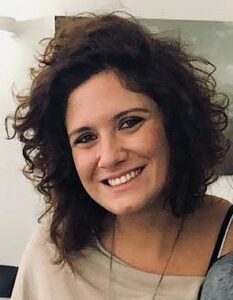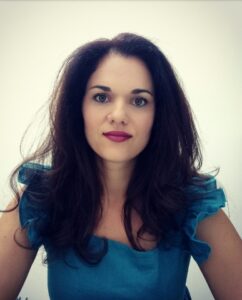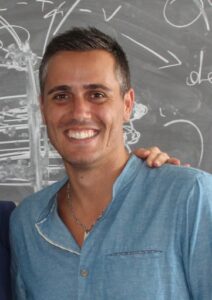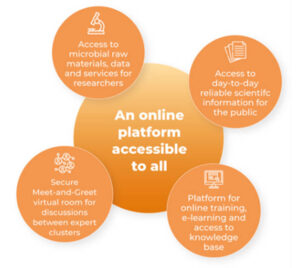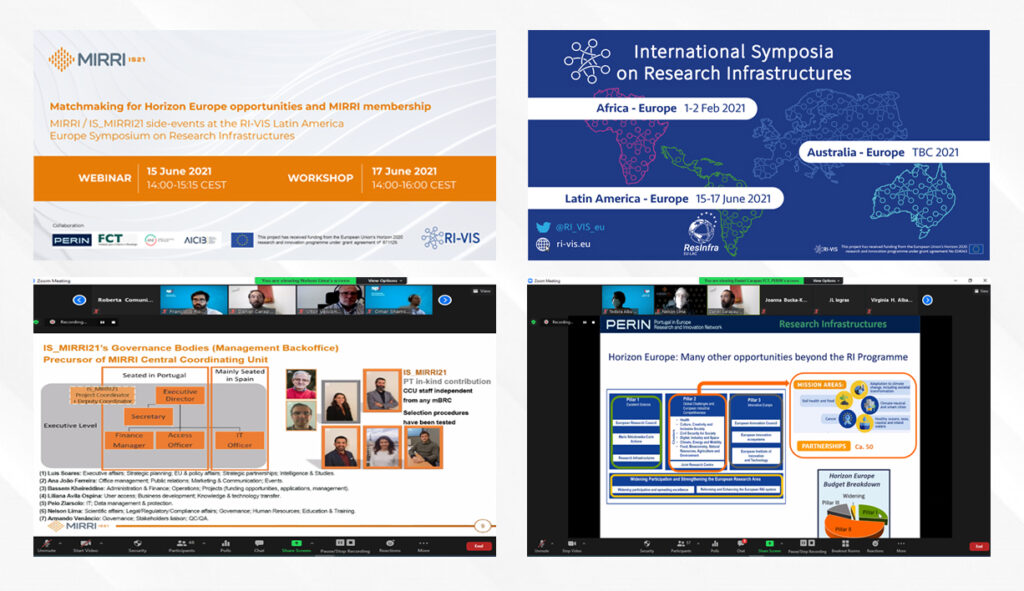
The partners of IS_MIRRI21, with the leadership of INRAE from France organised two webinars on November 18 and November 19, 2021, aiming at addressing microbial resources and microbial culture collections.
The first webinar, called “Microbial resources for a green, healthy and sustainable future”, focused on MIRRI’s Strategic Research & Innovation Agenda (SRIA) and how future research, innovation and market opportunities can be anticipated through the project’s strategic areas and further mapped under the Horizon Europe clusters on Health, Food, Bioeconomy, Natural Resources, Agriculture and Environment. After opening remarks by Luís Soares (MIRRI Executive Director), keynote speaker Dominik Sobczak (European Commission; ESFRI) addressed the relevance of research infrastructures to the new European Research Area and for delivering the impacts of Horizon Europe. MIRRI’s seven strategic areas were presented by Sylvie Brisse (Institut Pasteur), Nélson Lima (Universidade do Minho), Rosa Aznar (CECT/UVEG), Paris Laskaris (NKUA), Cristina Varese (UNITO), Craig Faulds (INRAe CIRM-CF) and Gerard Verkleij (KNAW). These presentations were complemented by speakers who showcased MIRRI’s participation in Horizon Europe and its clusters, such as the example of the ISIDOre project by Raquel Hurtado-Ortiz (Institut Pasteur), the BY-COVID project by Paolo Romano (USMI) and the general introduction of the Horizon Europe clusters of Health (Virginie Sivan, NCP-France, MESRI) and Food, Bioeconomy, Natural Resources, Agriculture and Environment (Marta Conde-Vidal, NCP-Spain, CDTI).
Finally, several scientific speeches were held, addressing the current status of microalgae as a source of biologically active compounds (Juan Luis Gomez, BEA), the use of microbial BRCs in support of the ecological transition to sustainable and healthy food products (Michel-Yves Mistou, INRAe-CIRM), the Arbuscular mycorrhizal fungi and other key organisms for improving crop production (Stéphane Declerck, BCCM-MUCL), the collaborative work experience in the field of oil bioremediation with industrial partners (Maria Kuyukina, PFRC UB RAS), the bioconversion of lignin-derived aromatics compounds into platform chemicals (Ronald de Vries, KNAW) and several scenarios on how to preserve yeast diversity from worldwide endangered cold habitats in the era of climatic change (Benedetta Turchetti, DBVPG).
The second webinar, called “Cutting-edge technologies for 2030 microbial culture collections”, took place on November 19 and was subdivided in a section about microbiota conservation and characterisation, the MALDI-TOF mass spectrometry and genomics. Matthew Ryan (CABI), Thomas Riedel (DSMZ), Perrine Portier (INRAe CFBP), Hauke Smidt (U Wageningen) and Vincent Thomas (BioAster) were the speakers of the session dedicated to microbiota, while Anneleen Wieme (BCCM/LMG), Sylvain Brisse (Institut Pasteur) and Vincent Robert (KNAW; Bioaware) discussed the applications of MALDI-TOF. Antonis Rokas (Vanderbilt Univ. Nashville), Sarah Lebeer (U Antwerpen) and Federica Palma (Institut Pasteur) delivered their presentations in the final session, dedicated to genomics, before Jean-Luc Legras (INRAe CIRM-Levures) concluded the event.
The first webinar provided insights into microbial solutions in line with the 2030 EU Food Policy, functions of soil microbes for plant health and the industrial scale-up of microorganism production to produce a healthier environment, among many other interesting speeches, research outcomes and recent findings. This webinar also showcased concrete destinations in Horizon Europe which may be funding opportunities for research and innovation in these fields. In sum, the presentations held had the objective of fostering ideas and innovations regarding applications of microorganisms in different sectors – and especially how these can have symbiotic effects with existing large organisms. The same applies to the second webinar, albeit the more technical content. The presentation in the November 19 webinar featured concrete suggestions and best practices with respect to the taxonomic composition of microbial communities, building databases for culturomics projects and using genomic libraries to study strain biodiversity, among other areas of application.
Over 340 participants from 42 countries attended the webinars, with the overwhelming majority (88%) coming from public organisations, that showed particular interest in MIRRI’s activities and future outlook. The partners of the H2020 project, IS_MIRRI21, were truly excited to have welcomed such a large crowd from different nations and more than happy to deliver information into the interesting and ever-dynamic world of microbiology and microorganisms. The presentation summaries can be read here.
For more information about MIRRI and microorganisms in general, make sure not to miss any of our upcoming event!
Subscribe to our newsletter, and get the most recent updates and announcements! Subscribe here.
Contacts:
For more information and feedback, please contact us at: franciscorocha@spi.pt; danielpichler@spi.pt.




